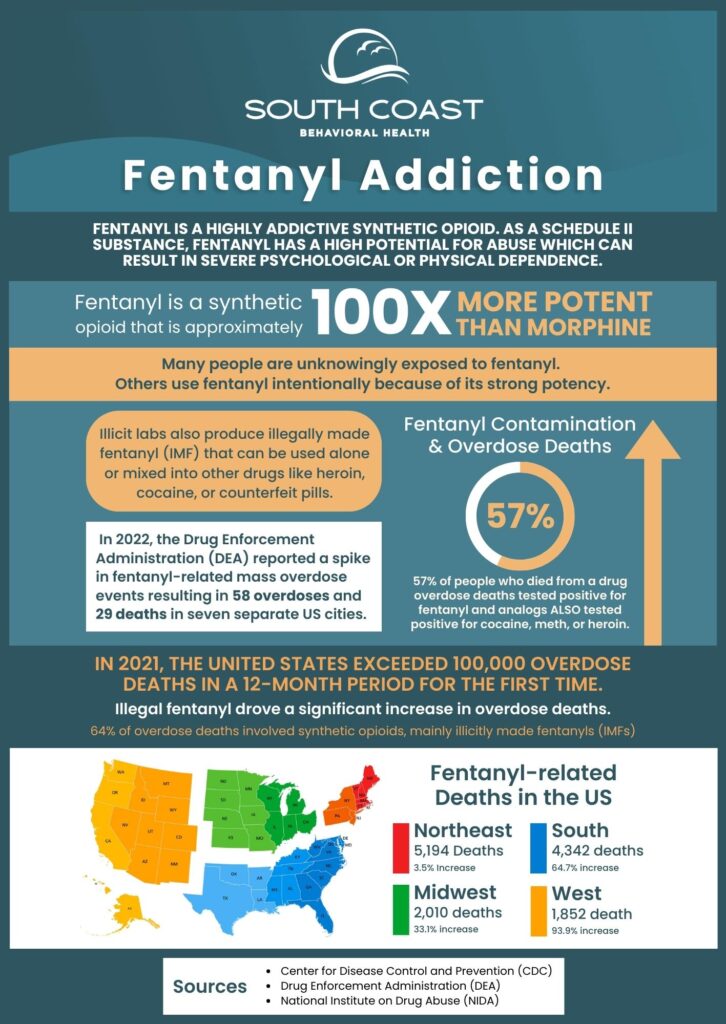Fentanyl Addiction
Fentanyl addiction is a serious problem that affects millions of people in the United States. Fentanyl is an extremely potent synthetic opioid that is prescribed to treat severe pain. Due to the high potency of this man-made drug, it is significantly stronger than both heroin and morphine, making it fatal in minuscule amounts.
This deadly drug has been linked to numerous overdose deaths across the United States and the world. For this reason, it is crucial to understand the complexities and devastating consequences of fentanyl abuse to successfully combat the opioid overdose crisis.

What Is Fentanyl Addiction?
Like morphine, prescription fentanyl is typically used to treat patients with severe pain, especially after surgery. It is also sometimes used to treat patients with chronic pain who can’t handle other opioids like hydrocodone or oxycontin.
Fentanyl can be taken in the following forms:
- Fentanyl injection
- Fentanyl patch
- Fentanyl throat lozenges
Fentanyl is one of the most powerful forms of opioid painkillers. You need a prescription for fentanyl, but it has also been manufactured and sold illegally on the streets. Because of this, it has become increasingly harmful and problematic in society. Illegal forms are unregulated and are manufactured without the important quality measures of pharmaceutical grade fentanyl.
Why Is Fentanyl Dangerous?
Fentanyl is addictive and dangerous because of its strength; it’s one of the more potent forms of opioids. Even if you are taking prescription fentanyl as instructed by a doctor, you can still become dependent on it. One sign of dependency is experiencing withdrawal symptoms when you stop using the drug. Like other opioids, you can be dependent on a drug without being addicted, but dependence can sometimes lead to addiction.
Fentanyl is exceptionally dangerous due to its overwhelming potency compared to other opioids. Physically, it can cause severe respiratory depression, leading to breathing difficulties and potential overdose. Mentally, fentanyl use can lead to euphoria and a strong desire for its effects, often culminating in addiction. Behaviorally, this potent drug can lead to risky patterns of use, as individuals may continually seek higher doses to achieve the same high, increasing the risk of overdose and negative consequences. Fentanyl’s unparalleled strength heightens the chances of overdose, making it a perilous substance even in small amounts.
The Dangers of Illegal Fentanyl
Illegal fentanyl is a major contributor to recent increases in synthetic opioid overdose deaths. According to LA County Public Health, synthetic opioids, including fentanyl, are now the most common drugs involved in drug overdose deaths in the United States. In 2017, 59 percent of opioid-related deaths involved fentanyl, compared to 14.3 percent in 2010.
Illegally manufactured fentanyl is sold in powder form, dropped onto blotter paper, put in eye droppers and nasal sprays, or made into phony pills that copy other prescription opioid pills. It’s not always easy to know what you are getting. Fentanyl can deceptively be mixed into other drugs, like heroin, cocaine, methamphetamine, and MDMA (ecstasy). Historically, deaths involving illicit fentanyl have mostly occurred in the 28 states east of the Mississippi River, where the heroin market has primarily been dominated by white powder heroin. The potent combination of fentanyl mixed with heroin or other illegal drugs is dangerous; people may not even realize that the drugs they are taking contain fentanyl, which increases the chances of overdose or death.
What Are the Signs and Symptoms of Fentanyl Addiction?
Fentanyl abuse can lead to dependence and in extreme cases, fentanyl addiction. When someone is addicted to drugs, they continue to use them even though they cause health problems or issues at work, school, or home. Addiction is the most severe form of a Substance Use Disorder (SUD) and can range from mild to severe.
Addiction to fentanyl would be considered an Opioid-Use Disorder (OUD). The DSM-5 specifically recognizes fentanyl abuse as an OUD. A person who would falls into the category of fentanyl dependency would be clinically considered to have an opioid use disorder (at the severe end of the continuum).
The Diagnostic and Statistical Manual of Mental Disorders, 5th Edition describes opioid use disorder as “a problematic pattern of opioid use leading to problems or distress,” with at least two of the following occurring within a 12-month period:v
- Taking larger amounts or taking drugs over a longer period than intended.
- Persistent desire or unsuccessful efforts to cut down or control opioid use.
- Spending a great deal of time obtaining or using the opioid or recovering from its effects.
- Craving, or a strong desire or urge to use opioids
- Problems fulfilling obligations at work, school or home.
- Continued opioid use despite having recurring social or interpersonal problems.
- Giving up or reducing activities because of opioid use.
- Using opioids in physically hazardous situations.
- Continued opioid use despite ongoing physical or psychological problems likely to have been caused or worsened by opioids.
- Tolerance (i.e., need for increased amounts or diminished effect with continued use of the same amount)
- Experiencing withdrawal (opioid withdrawal syndrome) or taking opioids (or a closely related substance) to relieve or avoid withdrawal symptoms
Understanding the severe nature of fentanyl addiction highlights the necessity of comprehensive opioid addiction treatment and support. Recovery from fentanyl addiction is possible with the right resources and commitment, offering a chance to regain control of your life.
Recognize the Signs of Fentanyl Addiction
Recognizing signs and symptoms of fentanyl abuse is crucial for early intervention. Common indications include:
- Physical Symptoms: Constricted pupils, drowsiness, and slowed breathing.
- Behavioral Changes: Neglecting responsibilities, secretive behavior, and increased risk-taking.
- Psychological Signs: Euphoria, mood swings, and strong cravings for the drug.
- Social Isolation: Withdrawal from friends and family.
- Loss of Interest: Decreased enthusiasm for activities and hobbies
If someone you know displays these signs, especially after opioid use, it’s essential to seek help immediately. Fentanyl addiction can lead to life-threatening consequences, and early intervention can be life saving.
The Link Between Fentanyl Addiction and Mental Health Disorders
The link between fentanyl abuse and mental illness is complex. Individuals suffering from mental health issues may turn to substances like Fentanyl to cope with their symptoms. When addiction and mental health disorders co-occur, it’s termed a dual diagnosis or co-occurring disorder.
- Self-Medication: Some individuals with depression, anxiety, or other mental health disorders misuse Fentanyl to alleviate emotional pain or distress.
- High Co-occurrence: Co-occurring disorders are prevalent. The Substance Abuse and Mental Health Services Administration (SAMHSA) reports that nearly 8 million adults in the U.S. suffer from both a substance use disorder and a mental health condition.
- Complex Treatment: Managing dual diagnoses is intricate. It requires an integrated approach addressing both addiction and mental health simultaneously.
- Higher Risk: Individuals with co-occurring disorders face an increased risk of overdose, suicide, and decreased overall quality of life.
Recognizing and treating co-occurring disorders is essential for effective recovery, emphasizing the importance of comprehensive mental health care in addiction treatment.
Wondering if Your Insurance Covers the Cost of Heroin Addiction Rehab?
When Do You Need Fentanyl Addiction Treatment?
You should consider seeking opioid addiction treatment when you notice signs of an opioid use disorder (OUD) impacting your life.
Some signs of opioid addiction include:
- Loss of Control: When the person can’t control their fentanyl use, consuming larger amounts or for a longer duration than intended.
- Neglecting Responsibilities: If fentanyl use disrupts work, education, or personal relationships, causing issues.
- Craving and Urges: Strong desires to use fentanyl, even when it’s harmful.
- Health Deterioration: When physical or mental health starts to deteriorate due to fentanyl use, leading to severe withdrawal symptoms and physical dependence.
- Social and Legal Issues: Involvement in illegal activities to obtain the drug or encountering social and legal problems.
- Withdrawal Symptoms: Experiencing withdrawal symptoms when not using fentanyl .
If you or someone you know exhibits these signs or experiences serious problems due to fentanyl addiction, it’s crucial to seek professional help. Early intervention and treatment can improve the chances of recovery and prevent further harm.
At South Coast, we are dedicated to providing specialized treatment to people suffering from fentanyl addiction and mental health disorders. Our team of experienced clinicians and healthcare professionals provides compassionate and individualized care to ensure our clients have the best possible chance for recovery.
Fentanyl Addiction Treatment Options
Fentanyl dependency can be treated through various methods, and a combination of approaches often yields the best results. Here’s an overview of what fentanyl treatment entails:

Fentanyl addiction treatment starts with a comprehensive evaluation by a healthcare professional to assess the addiction’s severity and identify any concurrent mental health disorders. This evaluation guides the creation of an individualized treatment plan for each client, ensuring tailored care and support.
To initiate the recovery process from fentanyl addiction, medical detoxification involves supervised withdrawal in a secure environment. Depending on the individual’s unique situation, medical experts can administer medication to alleviate withdrawal symptoms and guarantee their well-being.
Inpatient programs for opioid abuse help people in the early stages of fentanyl addiction recovery. Inpatient care incorporates 24/7 supervision, individualized treatment plans, medication management, evidence-based therapies, addiction education, peer-led support groups, and holistic treatments.
Medication-assisted treatment (MAT) for opioid use disorders involves the use of medications like methadone, buprenorphine, or naltrexone to manage cravings, reduce withdrawal symptoms, and block the euphoric effects of fentanyl. These medications can help individuals stabilize their lives and engage in other aspects of treatment.
Dual-diagnosis treatment services address the symptoms of addiction and any co-occurring mental health disorders. Treatment for co-occurring disorders often involves a combination of medication management and psychotherapy.
Evidence-based therapies like cognitive-behavioral therapy (CBT), dialectical behavioral therapy (DBT), and motivational interviewing (MI) help individuals identify and change addictive behaviors. Therapy can also help clients develop coping strategies and address underlying cause of fentanyl addiction.
Holistic treatments may include yoga, meditation, acupuncture, and other complementary therapies to address the physical, mental, and emotional aspects of fentanyl addiction.
Support groups like Narcotics Anonymous (NA) or group therapy sessions can be vital in maintaining long-term sobriety by offering peer support and shared experiences.
Customizing treatment to each individual’s specific circumstances is vital for achieving a successful recovery from fentanyl addiction. Employing a comprehensive approach that integrates medication (if necessary), therapy, and holistic support maximizes the likelihood of long-lasting sobriety and enhances overall quality of life.
Fentanyl Addiction Treatment at South Coast Behavioral Health
At South Coast Behavioral Health, we are dedicated to delivering comprehensive and personalized treatment for fentanyl addiction. Our team of certified and experienced clinicians specializes in assisting individuals battling fentanyl dependence, while also addressing underlying mental health concerns that may contribute to addiction. Our holistic approach to treatment prioritizes healing the mind, body, and spirit by targeting the root causes of opioid abuse.
Throughout the fentanyl addiction treatment process, we offer both inpatient and aftercare programs to ensure that each client receives the tailored support and services they need to achieve their recovery goals. Our programs are designed to cater to individual preferences and needs, providing a well-rounded approach to healing and overcoming addiction.
Our fentanyl addiction treatment programs include:
- Medical Detox Program: Medical detox is crucial for safely managing withdrawal symptoms and ensuring a stable transition to the next phase of treatment.
- Residential Treatment Program: Our inpatient program provides a structured and supportive environment. Clients receive therapy, medical care, and round-the-clock support to address their addiction and co-occurring disorders.
- Partial Hospitalization Program (PHP): PHP is a step-down level of care, offering full-day treatment while allowing individuals to return home or to a sober living environment in the evenings.
- Intensive Outpatient Program (IOP): IOP is a more flexible option that still provides rigorous therapy sessions but allows participants to maintain their daily routines.
At our integrated addiction treatment center, we offer a comprehensive range of evidence-based services for individuals struggling with fentanyl abuse and mental health concerns. Our goal is to empower clients to uncover the underlying causes of their addiction, modify problematic behaviors, and create effective relapse prevention plans.
To achieve this, our experienced team of professionals utilizes evidence-based therapies, holistic approaches, and medication-assisted treatment (MAT) to address both the physical and psychological aspects of opioid addiction. We are committed to guiding individuals on their journey toward recovery and long-term sobriety. If you or your loved one is facing fentanyl addiction, seeking treatment is crucial. Contact us today for more support and guidance.
Get A Confidential Assessment From A Recovery Specialist
Fentanyl Addiction Treatment in Orange County, CA
At South Coast Behavioral Health, our commitment is to help individuals struggling with opioid addiction achieve lasting sobriety and improved overall well-being. That is why our addiction treatment centers in Orange County, California provide evidence-based therapies, holistic approaches, and individualized treatment plans to help clients achieve lasting recovery from fentanyl addiction and co-occurring mental health issues. Each of our facilities is staffed with experienced clinicians who are dedicated to guiding individuals toward a healthier, drug-free life.
Our center provides fentanyl abuse treatment for men within our medical detox and residential treatment centers in Irvine, CA.
We offer fentanyl addiction treatment for women at our medical detox and residential treatment centers in Huntington Beach, CA.
Our center offers fentanyl addiction treatment for men within our residential inpatient facility in Costa Mesa, CA.
We provide fentanyl abuse treatment during our PHP and IOP programs in Newport Beach, CA.
If you or someone you know needs treatment for fentanyl addiction or any drug abuse treatment, South Coast Behavioral Health is here to help. Contact us today to start your recovery journey. Don’t let the threat of an opioid overdose hang over you. We can help you manage chronic pain and understand the dangers of Fentanyl.

















